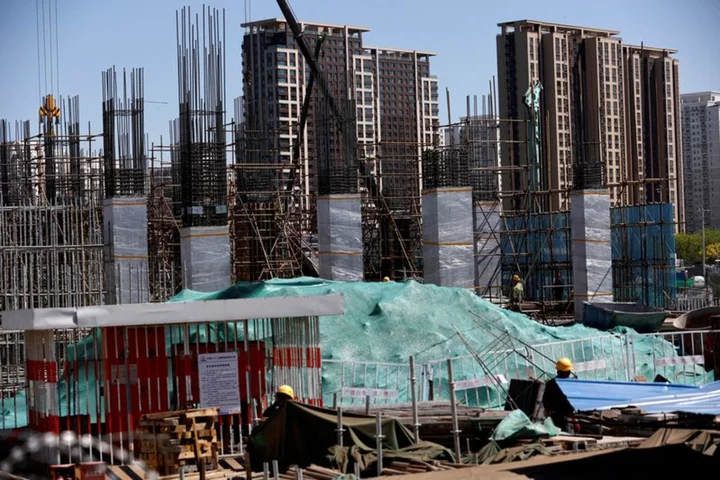By Samuel Shen and Tom Westbrook
Qingdao city in China's debt-laden Shandong province has set up a company to bail out its cash-strapped local government financing vehicles (LGFVs), sources said, as regional governments rush to reduce debt risks in a wobbly economy. Dongdin Industrial Group, funded by policy lender China Development Bank and having a registered capital of 10 billion yuan ($1.40 billion), is tasked with providing liquidity support to Qingdao's LGFVs - vehicles set up by local governments to finance mainly infrastructure projects, two sources said.
It is the first such mechanism of a local government to come to light, and represents intensifying efforts in China to prevent LGFV debt - estimated at more than $9 trillion - from derailing the world's second-largest economy.
The government of Qingdao and the China Development Bank did not reply to Reuters' requests for comment. Debt piles of Shandong LGFVs have jumped two-thirds since 2019 to 4.3 trillion yuan, according to estimates from Southwest Securities, as the pandemic and a sluggish property market hit the eastern province's fiscal income, forcing borrowing via LGFVs to sustain growth.
While no LGFV in China has defaulted in the public markets, cases of delinquencies in the private debt market are increasing, worrying Beijing. Big state-owned banks have recently rolled over loans to LGFVs or lent more to them.
A slew of city governments in Shandong, such as Jinan, Weifang and Gaomi, have over the past month signed strategic cooperation agreements with state banks including Agricultural Bank of China (AgBank) and China Construction Bank.
Other Chinese provinces, including Liaoning and Hunan, have also rolled out measures recently to mitigate LGFV debt risks, after President Xi Jinping presided over a Politburo meeting in late April urging local governments to "strengthen debt management, and strictly curb growth in hidden debt".
Qingdao has also stepped up debt monitoring to prevent any defaults in public markets, the sources said.
LGFVs must report repayment plans to the government three months before any bonds mature, they said. And one month ahead of maturity, cash-flow details must be submitted on a weekly basis.
LGFV BONDS 'STILL SAFE'
The push to avert systemic risks stemming from LGFVs played a hand in Goldman Sachs downgrading Chinese lenders, including AgBank and Industrial and Commercial Bank of China last week, citing their exposure to the vehicles.
The efforts, however, led some investors to believe Beijing will not tolerate LGFV defaults in public markets. "When something is classified as systemic risk in China, government officials will try their best to defuse such risk," said Zhai Jianye, general manager of Shoupu Fund Management Co. While some LGFVs have cash shortfalls, their publicly traded bonds "are still safe as long as the government remains committed to repayment", said Zhai, whose bond fund boosted LGFV holdings to 77% of its portfolio, up from just 47% in January. In a sign of such growing confidence, the risk premium of LGFV bonds over treasuries has shrunk five basis points (bps) this month on average from a three-month high of 136.69 bps, according to data provider Dealing Matrix. "The logic of LGFV bond investment is that money will be repaid as long as the government wants to. It's just a matter of how," said Zhou Tingzuo, co-founder of Shanghai-based hedge fund house Ning Yong Fu Fund Management Co. Debt extension in private markets and more support from banks "is clearly a way to ensure there will be no defaults in public bonds," said Zhou, who has increased his bets on LGFV bonds.
Still, borrowing costs remain high for fiscally weak provinces such as Tianjin that haven't done enough to shore up investor confidence. Tianjin LGFV bonds yield more than 514 bps over government bonds, compared with 200 bps for Shandong bonds, reflecting the elevated risks.
Fund manager Zhou said although he is bullish on LGFV bonds, "the first priority is to be absolutely diversified in investment. I cannot go all in on any one province." ($1 = 7.1680 Chinese yuan renminbi)
(Reporting by Samuel Shen and Jason Xue in Shanghai, Tom Westbrook in Singapore; Editing by Vidya Ranganathan and Muralikumar Anantharaman)









